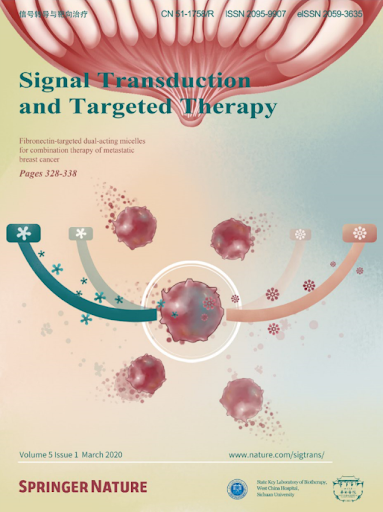Colony-stimulating factor 3 as a key mediator in the progression of idiopathic pulmonary fibrosis: a novel therapeutic target.
IF 52.7
1区 医学
Q1 BIOCHEMISTRY & MOLECULAR BIOLOGY
引用次数: 0
Abstract
Idiopathic pulmonary fibrosis (IPF) is a fatal lung disease characterized by excessive ECM deposition and myofibroblast accumulation driven by cytokine dysregulation. This study identified granulocyte colony-stimulating factor 3 (CSF3) as a key mediator of IPF progression. Elevated CSF3 expression was observed in the lung tissues of IPF patients. Recombinant CSF3 promoted myofibrogenesis in lung fibroblasts, whereas CSF3-deficient mice were protected from bleomycin-induced pulmonary fibrosis. Treatment with novel CSF3-neutralizing antibodies significantly restored fibrosis in IPF mice by suppressing myofibroblast differentiation and reducing ECM deposition. Here, we demonstrated a reciprocal regulatory relationship between CSF3 and TGF-β that amplifies pro-fibrotic signaling. Our mechanistic studies revealed that CSF3 acts as an upstream regulator of TGF-β, forming a positive feedback loop that significantly accelerates the fibrotic process. Knockout or neutralization of CSF3 suppressed fibrosis by reducing TGF-β levels, whereas treatment with recombinant CSF3 promoted fibrosis with increased TGF-β expression. Notably, while CSF3 inhibition reduced TGF-β expression levels, it did not decrease them below normal levels. This finding suggests that inhibiting CSF3 could simultaneously reduce fibrosis by suppressing excessive TGF-β expression while also minimizing side effects by maintaining TGF-β homeostasis. Taken together, these results provide strong evidence that CSF3 is a critical driver of IPF pathogenesis and that targeting CSF3 may provide a therapeutic strategy by modulating TGF-β signaling and restoring the ECM and cellular homeostasis.集落刺激因子3作为特发性肺纤维化进展的关键介质:一个新的治疗靶点。
特发性肺纤维化(IPF)是一种致命的肺部疾病,其特征是细胞因子失调驱动的过度ECM沉积和肌成纤维细胞积累。本研究发现粒细胞集落刺激因子3 (CSF3)是IPF进展的关键介质。在IPF患者肺组织中观察到CSF3表达升高。重组CSF3促进肺成纤维细胞的肌纤维形成,而CSF3缺陷小鼠可免受博莱霉素诱导的肺纤维化。新型csf3中和抗体通过抑制肌成纤维细胞分化和减少ECM沉积,显著恢复IPF小鼠的纤维化。在这里,我们证明了CSF3和TGF-β之间的相互调节关系,可以放大促纤维化信号。我们的机制研究表明,CSF3作为TGF-β的上游调节因子,形成一个正反馈回路,显著加速纤维化过程。敲除或中和CSF3通过降低TGF-β水平抑制纤维化,而重组CSF3治疗通过增加TGF-β表达促进纤维化。值得注意的是,虽然CSF3抑制降低了TGF-β的表达水平,但并未使其低于正常水平。这一发现表明,抑制CSF3可以通过抑制TGF-β过度表达来减少纤维化,同时也可以通过维持TGF-β稳态来减少副作用。综上所述,这些结果提供了强有力的证据,证明CSF3是IPF发病机制的关键驱动因素,并且靶向CSF3可能通过调节TGF-β信号和恢复ECM和细胞稳态提供治疗策略。
本文章由计算机程序翻译,如有差异,请以英文原文为准。
求助全文
约1分钟内获得全文
求助全文
来源期刊

Signal Transduction and Targeted Therapy
Biochemistry, Genetics and Molecular Biology-Genetics
CiteScore
44.50
自引率
1.50%
发文量
384
审稿时长
5 weeks
期刊介绍:
Signal Transduction and Targeted Therapy is an open access journal that focuses on timely publication of cutting-edge discoveries and advancements in basic science and clinical research related to signal transduction and targeted therapy.
Scope: The journal covers research on major human diseases, including, but not limited to:
Cancer,Cardiovascular diseases,Autoimmune diseases,Nervous system diseases.
 求助内容:
求助内容: 应助结果提醒方式:
应助结果提醒方式:


